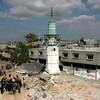
Palestinians in the northern Gaza Strip town of Beit Hanoun have described finding bodies dismembered by what they said was Israeli artillery fire early this morning, and added that many residents were fleeing the town for fear of further violence. They told how they have been left without water - and in many cases homes - after the Israeli military occupied the town of 50,000 inhabitants for a week before bombarding it less than 24 hours after withdrawing. “Right now, the only thing the people of Beit Hanoun need is to live,” said Yamen Zaqqout, a 28-year-old computer programmer. Read more about "We just need to live" say Beit Hanoun residents

A thousand West Bank Palestinians holding foreign passports have been expelled from their homes and thousands more face a similar fate after Israel tightened its visa regime, according to Palestinian campaigners. “After being married for 31 years, I face today a compulsory divorce as the Israeli government has refused to renew the visit visa of my wife who holds a US passport,” said Dr Adel Samara from Ramallah. Under the new policy, tourist visas are no longer being issued to foreigners. Up until March this year, Palestinians holding foreign passports had previously been renewing their three-month tourist visas, rather than go through the long and uncertain process of applying for residency permits from the Israeli government. Read more about Visa regime splits Palestinian families
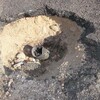
Israeli bomb disposal units are combing the north of the country for unexploded Hezbollah rockets left over from the recent conflict in an operation that will continue for months, Israeli police say. Hezbollah fired nearly 4,000 rockets - including more than 100 containing cluster bombs - into the densely populated Galilee region in Israel’s far north as well as cities further south such as Haifa, killing 43 civilians. While the risks to residents of southern Lebanon from an estimated one million unexploded cluster bombs fired by Israel are well-documented, Israeli officials say the world has largely ignored the problems caused by unexploded Hezbollah rockets in their country. However, no one has been killed or injured by unexploded rockets, Israeli police spokesman Mickey Rosenfeld told IRIN. Read more about Unexploded Hezbollah rockets pose risk
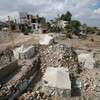
Up to 200,000 people could still be displaced in Lebanon nearly three months after the Israel-Hezbollah conflict ended, the United Nations Refugee Agency (UNHCR) said on Tuesday. “We don’t have the precise number of IDPs [internally displaced people] since there has been no formal registration, but we can estimate their number to 150,000 - 200,000,” Stephane Jaquemet, UNHCR regional representative in Lebanon, told IRIN. He added that the vast majority of the displaced live with friends or relatives and not in collective centres. This has made it harder for relief workers and authorities to work out an exact figure for the numbers displaced and to assess their needs. Read more about Up to 200,000 still displaced after war, UN says
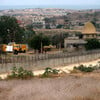
Hopes that the single border crossing between the Gaza Strip and Egypt would reopen and bring relief to hundreds of Gazan medical patients have been dashed after reports of an imminent Israeli attack on the border were met by the deployment of thousands of Egyptian troops to the area. Maariv, an Israeli daily newspaper, reported on 27 October that the Israeli government had discovered tunnels allegedly used by Palestinian militants to smuggle weapons from Egypt to the Gaza Strip. It said the Israeli government planned to attack the border region with precision-guided rockets. Read more about Gaza's medical lifeline cut by border closures
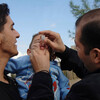
The destruction in villages and displacement of residents in southern Lebanon from the recent war posed problems for medical volunteers on the first day of a national emergency polio immunisation campaign for children on Monday. “Usually, we would know exactly where to go to immunise the children,” said nurse Nawal Saab, a member of one of the teams carrying out door-to-door immunisations in Bint Jbeil, 110 km south of Beirut. “This year, because so many houses have been destroyed and so many families have had to move in with relatives, outreach has been rendered more complicated.” Read more about Destruction and displacement hamper vaccination campaign
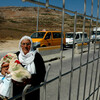
The number of roadblocks and checkpoints in the West Bank has risen by 40 per cent since the start of 2006, with 528 permanent and temporary checkpoints and physical roadblocks disrupting all aspects of Palestinian life, according to the United Nations Office for the Coordination of Humanitarian Affairs (OCHA) in Jerusalem. In addition to stifling Palestinians’ ability to work, these obstacles are causing increasing desperation among the population. “My city is nothing more than a big prison,” said Tamer Mohammed, a 26-year-old Nablus Municipality employee. Read more about West Bank under lockdown

“Iraqis want us to leave their country. Militias started to target us and force us out from our houses accusing us of being Saddam’s followers. Sometimes I work as a vegetable seller to get some money since I lost my job and my family needs to eat. I am desperate and do not have a choice and don’t know where to go. … They [militias] killed my father, brother, sister and two nephews because they refused to leave their home and I am sure that soon they will come after me. What will I do having four children to look after, without a job and without money? God bless us, the landless Palestinians.” Read more about "I will only leave this house in a coffin"
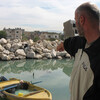
Wissam Arab pointed sadly at shredded nets and broken pieces of wood in the dirty water in Beirut’s Ouzai Harbour. It is all that remains of his work over the past 11 years. Arab’s fishing boat was destroyed in the July-August conflict between Hezbollah and Israel. It lies 15 metres deep in the Mediterranean Sea, now polluted after an Israeli air strike on a nearby power plant created a massive oil spill. His livelihood is in tatters, he said. “The sea was my friend. Now, even divers are scared of going under the water to check on my boat. It was drowned by one of the rockets that hit the harbour,” Arab told IRIN. Read more about Fishermen survive on handouts
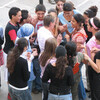
Thousands of children returned to school across Lebanon on Monday after a summer of war, destruction and displacement. “I am happy to be back in school,” said 11-year-old Fatima Aasi, who goes to school in her home town of Ansariyeh, 30km south of Beirut. “During the war we were very scared, but now I feel like things will be normal again.” After the United Nations-brokered ceasefire that ended the 34-day conflict between Israel and Hezbollah on 14 August, the Ministry of Education, in partnership with UNICEF, initiated a national back-to-school campaign with a commitment to ensuring that children in public schools could begin classes on October 16 - three weeks later than the usual start date. Read more about New school year gets underway with few hitches









